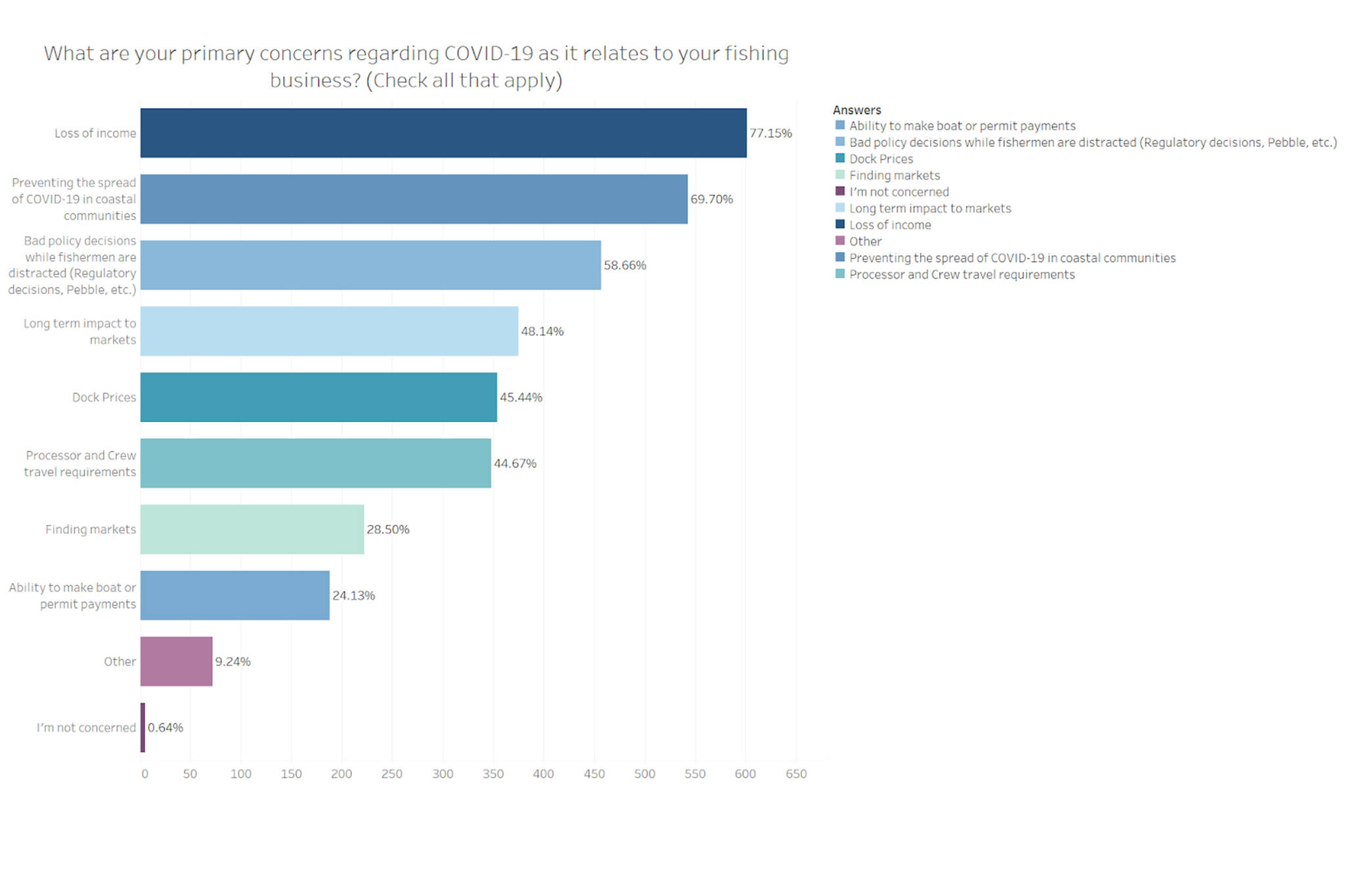Alaska’s fishermen are worried about lost income, spreading COVID-19 to coastal communities and weary of policy decisions made amid a pandemic, according to a recent survey of nearly 800 commercial fishermen.
In light of the COVID-19 pandemic, SalmonState, an Alaska-based nonprofit, surveyed 779 fishermen throughout the state to gauge their primary concerns from before and after the coronavirus outbreak.
Lost income, preventing spread of the coronavirus and “bad policy decisions while fishermen are distracted” were the three most prevalent COVID-19-related concerns, according to the survey that was conducted between April 14 and May 3. Those concerns were shared by 77%, 70% and 59% of respondents, respectively.
“I assume everybody’s feeling the economic uncertainty,” said Tyson Fick, Southeast Alaska fisherman and associate for SalmonState, in a video interview. “Whether you want to call it price of fish or loss of income.”
How fishermen may react to that uncertainty worries Fick and Lindsey Bloom, campaign strategist for SalmonState, who joined Fick for a video interview.
In Southeast Alaska, 60% of fishermen said they will seek additional income because of COVID-19. Thirty-two percent said they would fish with smaller crews and 25% said they would fish a longer season. Overall, almost 56% of fishermen surveyed said they would seek additional income, 29% said they would fish a longer season and 28% said they would fish with less crew.
[State reports 12 new cases on June 18]
“I don’t like that because then we have some safety problems of people out alone in October,” Fick said.
Nearly 83% of fishermen surveyed said direct funding to fishermen would be the best way for emergency funding to help the industry.
There are multiple programs that provide relief for fishermen, said Glenn Hoskinson, special assistant to the Department of Commerce commissioner, in an email.
Fishermen who hold a business license and meet criteria set by the state are eligible for AK CARES grants, Hoskinson said. Also, the Division of Economic Development administers 10 loan programs, some of which are specifically designed to provide loans to commercial fishermen and fisheries.
Additionally, Alaska received $50 million in federal relief funding for fishery participants, said Rick Green, special assistant to the Department of Fish and Game commissioner.
In an email, Green said that money will be distributed through the Pacific States Marine Fisheries Commission based on a plan developed by the department, which is working on a plan that would ensure funds are distributed quickly.
“Congress would like to see all funds expended by September 2020,” Green said. “However, the ADF&G understands that many fisheries are currently underway, or have not yet been prosecuted, and is working with NOAA Fisheries and the PSMFC to ensure all affected fisheries are eligible and that applicants have adequate time to submit applications.”
Direct payments to fishery participants are authorized under Section 12005 of the CARES Act, Green said. That’s the same section of the act that led to Alaska receiving $50 million.
An application process is still being worked out, according to state guidelines, but interested parties are encouraged to sign up for updates at https://public.govdelivery.com/accounts/AKDFG/subscriber/new?topic_id=AKDFG_416.
Pre-pandemic problems
The top pre-COVID-19 concerns cited by commercial fishermen in the survey included fish prices, the proposed Pebble Mine project and climate change, according to the survey. Those responses netted 65%, 60% and 53% of the vote respectively.
Among the surveyed fishermen, stopping the proposed Bristol Bay mine was the most popular request of the government at both state and federal levels.
The survey was conducted before a Pebble Partnership proposed a dividend that would distribute a percentage of revenue created by the mine among year-round Bristol Bay residents.
[Pebble Project developer proposes dividend program]
Jeff Turner, a spokesperson for the governor, said in an email Pebble Project sponsors have not yet submitted applications to the state to build or operate a proposed mine. Turner said Gov. Mike Dunleavy generally supports development and the project should be treated like any other proposed mining project.
“The Governor supports mining, oil and gas extraction, timber, commercial fishing and all other natural resource development projects that can meet or exceed Alaska’s stringent environmental standards, which are considered the highest in the world,” Turner said. “Governor Dunleavy has consistently stated the Pebble Project, located on state land, should be treated in the same manner as any other proposed development by undergoing a rigorous and impartial analysis by Alaska’s regulatory agencies.”
While the proposed mine isn’t a Southeast Alaska project, it raised concerns among Southeast fishermen.
The order of concerns changes if responses are filtered for the 239 fishermen who identified as being from Southeast Alaska, Bloom said, but Pebble still cracks the top three.
In Southeast, climate change ranked as the second-most pressing concern with nearly 58% of the Southeast fishermen identifying it as a primary concern. Fish prices were again No. 1 at 69%, while Pebble Mine and habitat loss were each tabbed as concerns by almost 39% of respondents.
“For Southeast, climate change is feeling pretty big and bold,” Bloom said.
• Contact Ben Hohenstatt at (907)308-4895 or bhohenstatt@juneauempire.com. Follow him on Twitter at @BenHohenstatt

